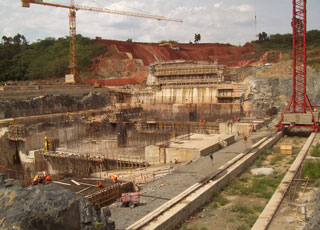
By Obed K. Katureebe
The Bujagali Interconnection Project (IP) for constructing the system of high voltage electrical transmission lines and related facilities to interconnect the Bujagali Hydropower Project (HPP) with the national electrical grid is under threat unless compensation issues are resolved.
The Bujagali HPP, which is a 250 MW hydropower project on the River Nile near Jinja in eastern Uganda, is not directly affected. But if the IP fails or delays, the Bujagali dam could end up generating power that is not transmitted.
At the centre of the dispute is the Resettlement Action Plan (RAP) for Wayleaves and Right of Way (ROW) acquisition component. This component is supposed to be solely financed by the government of Uganda to the tune of about Shs 33.4 billion. Its main implementer is the Uganda Electric Transmission Company Ltd (UETCL).
The rest of the Bujagali Power Project, which has two components: the Engineering, Procurement, and Construction (EPC) and the IP, is financed jointly by African development Bank (AfDB), European Investment Bank, the IFC and the KFW, a German Bank to the tune of US$ 772 million. The sponsor of the HPP is Bujagali Energy Ltd (BEL), a project-specific company owned by SG Bujagali Holdings Ltd, which is a wholly owned affiliate of Sithe Global Power, LLC and IPS (Kenya) Ltd of the Aga Khan.
In an interview Click here, the Minister of state for Energy, Mr Simon D’ujanga told The Independent that the compensation issues had been resolved but our investigations confirm the contrary.
The transmission project was supposed to have begun in July 2008 and completion was expected to be in July 2010 and the hand over ceremony for the first unit of 50 MW is scheduled for October 2010.

But work to construct the steel lattice towers; including soil investigations, foundation excavation and civil works is going on only in isolated areas.
In one case, staff of Joti Services; the India-based company contracted to do the towers, were chased by angry villagers.
‘We couldn’t allow them to trespass on our plots again without being compensated first,’ said one of the residents.
Work has begun in Mabira Forest area where there are no people affected and Jinja. The Projects Implementation Manager UETCL, Mr Makuba Dennis blames speculators.
‘The 1998 land law seems to have given land owners a lot of rights on their land and as a result they are coming out with all kinds of complications in order to make a fortune overnight,’ he said.
But the Chief Government Valuer, Mr A.J Bwiragura, downplayed the crisis. ‘Those complaints are natural and they should not surprise anybody,’ he said.
He argued that his office was studying those claims together with the consultants, the East African Surveyors and Valuers.
Delayed verification of legal documents such as letters of administration by the Justice department and verifying of land titles of the claimants is also slowing down the compensation exercise. The Administrator General’s office is said to be slow in verifying claims of the dead.
Large estates such as Sugar Corporation of Uganda Ltd, Uganda Tea Corporation, and Kampala City Council, are demanding higher rates than those approved by the government valuer. Ironically, most of these estates government of Uganda has 50 percent shareholding.
The Buganda kingdom has also rejected the government valuer’s price.
Even the National Association of Professional Environmentalists has a Shs 11 trillion case.
So far, the government has paid off 56 percent of the claimants and 46 percent who now number 107 people have refused the valuers figure and some are already in court. A total of 169 disputes remain unresolved and are threatening to blow out of proportion.
As a result, the government is considering creating a suspense account for unresolved cases and going ahead with the project.
UETCL is also mooting plan B. According to Mr Bakuba, UETCL is moving in to connect some megawatts on the national grid on the Nalubale switchboard via the Tororo power line which is only five kilometres from the Bujagali dam.
Under the IP, UETCL is supposed to build and operate a new 70km-long high voltage 220kv line to move power from Bujagali to a sub-station at Kawanda, a 5km-long high voltage 132kv line from Bujagali to the Owen Falls dam, and another 17.5km-long 132kv line from Kawanda to a sub-station in Mutundwe.
In total, the new line will pass through 55 villages in Kampala, Wakiso, Mpigi and Mukono districts.
The main impact in these villages will be displacement of people and property to create a corridor ranging between 30 metres-wide (for the 132kv) and 40 metres wide (for the 220kv) in which no houses or farming activity will be permitted.
At the centre of the corridor will be five-metre wide corridor called the right-of-way (ROW). UETCL is supposed to buy this land from its owner, compensate for loss of property and disturbance.
In case of the wider area, called the ‘wayleaves’, UETCL will not buy the land but merely compensate for loss of property.
Where the corridor will impact on a residence, the owner/tenant will have the option of receiving cash or be resettled in a new home at a different location.
However, disputes have erupted between the Chief government Valuer and persons affected by the wayleaves acquisition regarding the value of land and houses.
Prossy Namalwa’s house was valued at only Shs 9 million by the East African Valuers, a company hired by UETCL. But the same property was valued at Shs 50 million by an independent valuer. Shaban Kabali claims his plot was bought at Shs 12 million and it was valued at Shs 3 million by the East African Valuers. Kabali says he even provided the valuing officials with his purchase agreements but they did not reconsider.
Affected residents suspect someone wants to cheat them.
‘People are forced to sign documents whose content they don’t know. When you decline to sign you are reminded of how you can’t win a court case against the government,’ said Nsubuga.
Part of the problem has been a disagreement between the World Bank’s requirements and the government valuer’s methods. The Ugandan law, on which the government valuer approval is based, uses the depreciated cost while the lenders require replacement Cost. Depreciated cost is where the valuer values the object in its present depreciated form while the replacement cost seeks to value the object as it was when it was put up. UETCL project implementers have indicated to the government valuer that replacement is funding requirement for the project as outlined in the safeguard policies of the World Bank (O.P 4.12). Compensation and resettlement should aim at restoring project affected persons livelihoods or making them better. But the government valuer insists on compensation on the depreciation cost.
There are also claims that BEL has failed its contractual obligations to provide adequate staff for design approval and routine supervision.
BEL has allegedly provided only one engineer, Mr. John Berry.
However, a senior BEL official who preferred anonymity said that claim was false.
‘We have enough engineers on the ground,’ he said, ‘those claims must be coming from UETCL but it is not correct at all.’
The delayed handover of the wayleaves corridor to the contractor to carry out works is causing concern among project implementers.
In some areas, like part of the 17.5 Km Kawanda ‘” Mutundwe 132 KV line stretch, it has not been possible to access the line corridor at all.
UETCL has established consulting committees in Mutundwe, Nsangi, Nabweru, Nangabo, Kira, Kawega, Mukono, Nagojje, Najemba, Wakiso and Njeru.
Compensation options include, either a plot with a model house at Namusera in Wakiso district or building materials worth Shs 25 million or Shs five million as cost of labour, and Shs 300,000 for transport plus 30% of the value of a person’s property as disturbance fee.
Many affected families have rejected relocation to Namusera as too rural, without running water and electricity.
‘We are not refugees to be relocated,’ said Douglas Nsubuga, chairman of the disgruntled residents, ‘let them compensate us (with cash) and we get plots of our choice.’ He said that those who preferred to be compensated with houses signed while those who wanted a monetary compensation declined to sign.
But Nsubuga said he has heard complaints from those who chose houses that the prices of the construction materials were inflated and the houses are of poor quality.
But UETCL is equally determined to compensate in kind. It claims that experience shows that once affected people are paid cash, they use the money to cater for personal expenses and forget its purpose.
 The Independent Uganda: You get the Truth we Pay the Price
The Independent Uganda: You get the Truth we Pay the Price



